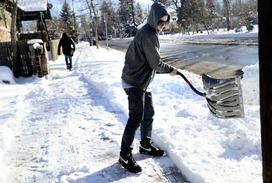
Everyone knows that snow causes headaches, but did you know there is a time limit for property owners to clear their property safely or they may face city fines? There's even the possibility of civil lawsuits. When winter hits, homeowners and landlords should grab their shovel, stock up on salt and get the job done right to avoid these complications. Read more for details and the time limit to clear the snow before fines are given.
City Fines
Under the Philadelphia Code, all property owners must meet the following requirements for snow removal:
- Clear the sidewalk with a 3 foot wide path through the snow and ice
(A one foot path may be cleared if the sidewalk is less than 3 feet wide)
- Avoid clearing any snow or ice into the street
- Multifamily houses must be cleared by the property owner or their contractor
- Must be completed within 6 hours after snowfall ends
Any property owner who does not comply with these requirements faces up to $300 in fines. However, there is an even bigger threat to a property owner who fails their duty to clear the ice and snow:
Civil Lawsuits
Every year, thousands of lawsuits are filed from people slipping on snow or ice and injuring themselves. If the falls occurs on private property, the owner of that property may be found legally responsible and be required to pay for the damages.
A property owner who fails to clear snow or ice from their property, or who clears it poorly and unsafely, is running the risk of being hauled into court and facing responsibility for the injuries.
If you are a renter, it is very important that you look at your lease to see if you are responsible for snow and ice removal. You may be required to perform these duties instead of the landlord. Any failure to do so could result in a personal lawsuit against you if someone is injured on the snow or ice.
If You Fall On Property That Was Not Safely Cleared
If you are injured as a result of an unsafe condition involving snow or ice, be sure to contact us immediately. There are many important details in snow and ice cases, and timing is crucial.
City Fines
Under the Philadelphia Code, all property owners must meet the following requirements for snow removal:
- Clear the sidewalk with a 3 foot wide path through the snow and ice
(A one foot path may be cleared if the sidewalk is less than 3 feet wide)
- Avoid clearing any snow or ice into the street
- Multifamily houses must be cleared by the property owner or their contractor
- Must be completed within 6 hours after snowfall ends
Any property owner who does not comply with these requirements faces up to $300 in fines. However, there is an even bigger threat to a property owner who fails their duty to clear the ice and snow:
Civil Lawsuits
Every year, thousands of lawsuits are filed from people slipping on snow or ice and injuring themselves. If the falls occurs on private property, the owner of that property may be found legally responsible and be required to pay for the damages.
A property owner who fails to clear snow or ice from their property, or who clears it poorly and unsafely, is running the risk of being hauled into court and facing responsibility for the injuries.
If you are a renter, it is very important that you look at your lease to see if you are responsible for snow and ice removal. You may be required to perform these duties instead of the landlord. Any failure to do so could result in a personal lawsuit against you if someone is injured on the snow or ice.
If You Fall On Property That Was Not Safely Cleared
If you are injured as a result of an unsafe condition involving snow or ice, be sure to contact us immediately. There are many important details in snow and ice cases, and timing is crucial.
 RSS Feed
RSS Feed
